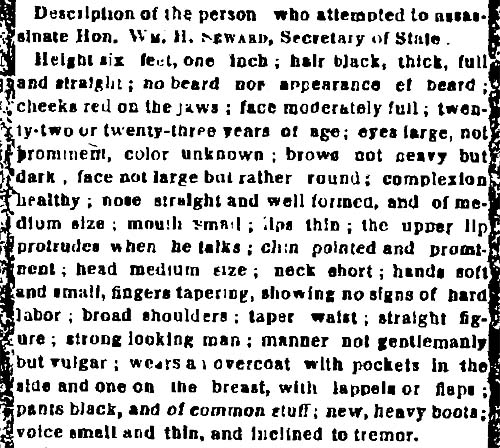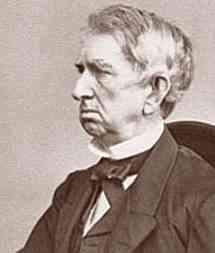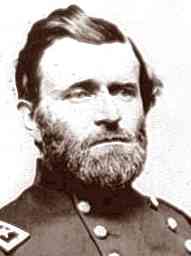Dr.Verdi had left his patient but a short time before, and had consoled the family that had for days
been suffering the greatest anxiety on account of the Secretary's condition,
by taking a favorable view of the symptoms. The family worn with watching and anxiety, were disposing
themselves for the night.
Sergeant George P. Robinson, acting as attendant nurse, was watching by the bedside in company with Miss Seward,
the Secretary's daughter. Frederick D. Seward occupied the room at the head of the stairs. All the rooms
occupied by the Secretary and his family were on the second floor, and were reached by a flight of stairs
in the hallway.
The second waiter, William H. Bell, a colored lad of nineteen was stationed at the hall door. Being
somewhat relieved of their anxiety by the doctor's favorable view of the case, all were anticipating
a night of quiet rest. The doorbell rang and was responded to by Bell, the colored waiter.
Immediately upon the opening of the door, Payne stepped into the hall. He was a tall,
broad-shouldered, muscular man, as agile and ferocious as a panther; a low-browed, scowling,
villainous-looking specimen of humanity, the animal predominating largely in every feature of
his visage and expression of his countenance.


Microfilm: Send Us Payne's Clothes
There he stood, holding in his left hand the package, and keeping his right hand in his overcoat
pocket. He demanded of the boy to be allowed to see the secretary, telling his story about being
sent by Dr. Verdi to deliver them edicine with his directions. The porter told him that his
orders were to admit no one, and that he could not see Mr. Seward; that he would deliver the
package himself. To this Payne would not comment, but persisted in saying that he must
see Mr. Seward. After considerable parleying, he started upstairs, and the porter, seeing that he
would go, and thinking that he might complain of his conduct to the secretary, asked him to pardon him, to which
Payne replied: "Oh, I know; that's all right."
He was wearing heavy boots and took no pains to walk lightly as he went up the stairs,
whereupon the porter requested him not to make so much noise, to which, however, he paid no
attention. As he approached the head of the stairs, he was met by Mr. Frederick Seward who had
been attracted by the noise, to whom he said, "I want to see Mr. Seward." Frederick went
into his father's room, and finding him asleep, returned saying, "You cannot see him." All
this time Payne stood holding the package in his left hand, grasping with his right hand the
pistol in his overcoat pocket. Frederick requested him to give him the package, saying
that he would deliver it; but Payne persisted in saying that that would not do, he must
see Mr. Seward -- he must see him.
Frederick finally said, "I am proprietor here, and his son:
if you cannot leave your message with me, you cannot leave it at all." Payne still continued
parlaying with Frederick for some time; but finding that his talking availed nothing, he started as if to go
downstairs. This, however, was only a feint on his part in order to throw Frederick off his guard
and to get rid of the porter who stood behind him.
He again walked so heavily that the porter requested him not to make so much noise; but at that moment, Payne having
prepared himself for the encounter, turned quickly, and making a spring towards Frederick, struck him two or three times
with the pistol, which he had all the time held in his hand, fracturing his skull, and knocking him
senseless to the floor.
Having learned which was the room occupied by the invalid by seeing Frederick go into it, Payne
rushed past the prostrate man, opened the door of the Secretary's room, and was met by Sergeant
Robinson. Having broken and thrown down his revolver in his encounter with Frederick, he had drawn his dagger, and at his first encounter
with the Sergeant, he struck him with the knife, cutting an ugly gash in his forehead and partially
knocking him down.
 He then pressed rapidly forward, knife in hand, to where the invalid lay in his bed. Throwing himself
upon him, he commenced striking at his face and neck with his dagger. The Secretary was reclining in a half-sitting
position, having the coverings well drawn up about his neck and chin, to which circumstances the failure of the
wouldbe assassin to take his life was no doubt due.
He then pressed rapidly forward, knife in hand, to where the invalid lay in his bed. Throwing himself
upon him, he commenced striking at his face and neck with his dagger. The Secretary was reclining in a half-sitting
position, having the coverings well drawn up about his neck and chin, to which circumstances the failure of the
wouldbe assassin to take his life was no doubt due.
The Sergeant as soon as he recovered his feet, sprang upon Payne, and Major Seward, having been awakened by the
screams of his sister, sprang into the room in his night-dress. Finding the Sergeant grappling him in such
a way as to hinder the effectiveness of his thrusts at the Secretary, and probably thinking that he had accomplished
his purpose, the assassin turned his attention toward making his escape. In disentangling himself
from the grasp of the two men who now had hold of him, he gave Major Seward several severe cuts about
the head and face, crying all the time, "I am mad! I am mad!"
Finally tearing himself loose, he started to make his way to the street. Meeting a Mr. Emrick W. Hansel, another
nurse, on the stairs, he made a thrust at him with his knife, inflicting an ugly wound. He now left
the house leaving five of the inmates stabbed, cut and bleeding behind him. Having reached the street,
he deliberately threw his dagger away, mounted the horse which he had hitched in front of the door, and rode off.
After the attack at Secretary Seward's, Dr. Verdi and two or three other surgeons were at once called to examine and treat the Secretary and the other victims
of Payne's dagger. The house in which the onslaught was made had the appearance of a charnal house or slaughter-pen. The Secretary
was found to have received three or four severe cuts about the face and neck, which were only made dangerous by the loss of
blood they had occasioned and the weak condition of the patient.
The Secretary made a slow but good recovery. Of the other four wounded men, the wounds of Mr.Frederick
Seward proved the most serious, as his skull had been fractured and depressed, so as to render him unconscious,
from which condition he was only recalled by a surgical operation. All finally recovered.
OTHER ATTEMPTS
On the evening of the 14th, Booth had called at the Kirkwood House, where Vice-President Johnson was stopping,
 and
left a card on which was written: "Don't wish to disturb you. Are you at home? J. Wilkes Booth."
and
left a card on which was written: "Don't wish to disturb you. Are you at home? J. Wilkes Booth."
On the evening of the 13th, a man appeared at Secretary Stanton's house where General Grant was that evening,
had asked to have both General Grant and Secretary Stanton pointed out to him which was done. He did not speak to either of them,
and lingered in the hall watching them and sat down on a step of the front steps until he was driven away.
This was the sum of what was actually and positively known of the facts as to the assassination of the
President, the attempted assassination of Secretary Seward, and the movements of the conspirators on the 19th.
 CONTINUE
CONTINUE

-
 A Lawyer/Soldier Called To Serve
A Lawyer/Soldier Called To Serve
 Colonel Burnett,
Colonel Burnett,  Mood of the Time,
Mood of the Time,  Deathbed
Deathbed
 What Was Known
What Was Known
 Investigation,
Investigation,  Assassination,
Assassination,  Seward's Attack,
Seward's Attack,  Other Attempts
Other Attempts
-
 The Investigation
The Investigation
 First Steps,
First Steps,  Military Court
Military Court
-
 The Conspiracy
The Conspiracy
 Planning,
Planning,  14 April 1865,
14 April 1865,  The Escape
The Escape
-
 The Search Tightens
The Search Tightens
 Cornered,
Cornered,  Garrett's Barn
Garrett's Barn
-
 The Trial and Its Aftermath
The Trial and Its Aftermath
 The Sentences,
The Sentences,  Habeas Corpus,
Habeas Corpus,  Gen. Hancock,
Gen. Hancock,  Mrs Surratt,
Mrs Surratt, 
 An Inhuman Crime?,
An Inhuman Crime?,  Pres. Johnson and Gen. Holt,
Pres. Johnson and Gen. Holt,  Military or Civil
Military or Civil
-
 Lincoln
Lincoln
 A Man for the Ages,
A Man for the Ages,  Lincoln Links,
Lincoln Links,  Lincoln Books,
Lincoln Books,  Newspaper Accounts
Newspaper Accounts
 Assassination Microfilm
Assassination Microfilm
-
 Brig.Gen. Henry L. Burnett
Brig.Gen. Henry L. Burnett












 Copyright © 1998, Mary S. Van Deusen
Copyright © 1998, Mary S. Van Deusen